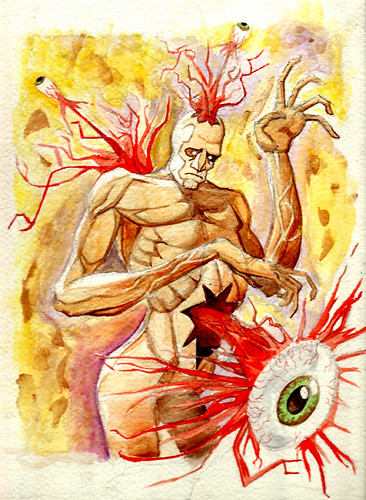 Scientific American | Problem: you’re a fungus that can only flourish at a certain temperature, humidity, location and distance from the ground but can’t do the legwork to find that perfect spot yourself. Solution: hijack an ant’s body to do the work for you—and then inhabit it.
Scientific American | Problem: you’re a fungus that can only flourish at a certain temperature, humidity, location and distance from the ground but can’t do the legwork to find that perfect spot yourself. Solution: hijack an ant’s body to do the work for you—and then inhabit it.A paper, to be published in The American Naturalist’s September issue, explores the astounding accuracy with which this fungus compels ants to create its ideal home.
The Ophiocordyceps unilateralis fungus infects Camponotus leonardi ants that live in tropical rainforest trees. Once infected, the spore-possessed ant will climb down from its normal habitat and bite down, with what the authors call a "death grip" on a leaf and then die. But the story doesn’t end there.
"The death grip occurred in very precise locations," the authors write. All of the C. leonardi ants studied in Thailand’s Khao Chong Wildlife Sanctuary had chomped down on the underside of a leaf, and 98 percent had landed on a vein. Most had: a) found their way to the north side of the plant, b) chomped on a leaf about 25 centimeters above the ground, c) selected a leaf in an environment with 94 to 95 percent humidity and d) ended up in a location with temperatures between 20 and 30 degrees Celsius. The researchers called this specificity "remarkable."
In other words, the fungus was transported via the zombie ant to its prime location. To see just how important this accuracy is to the fungus, the researchers identified dozens of infected ants in a small area of the forest. Some of the ants were moved to other nearby heights and locations, and others were left to sprout spores just where they had died.
Those ants that were left where O. unilateralis directed them grew normal, healthy hyphae (fungal threads) within several days, but those that had been moved never did.
"I cannot think of another example [of adaptive behavioral changes] as specific as this one," Edward Levri, who has studied behavioral changes in parasite hosts but was not involved in this study, wrote in an e-mail. "The fact that infected individuals all die in a 'lock-jawed' position, at 25 centimeters above ground, mostly on the north side of the tree is amazing and suggests that multiple behaviors and possibly multiple manipulatory physiological mechanisms may be required by the parasite."
















